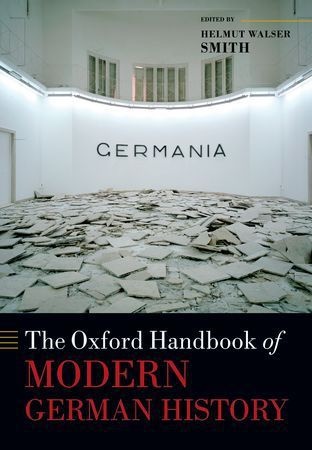Read more
Zusatztext How else might we organize our thinking about the past? This question is particularly pressing at a time when many look to history for concrete answers and explanations: the media! the general public! school teachers and! last but not least! the students we teach. Oxford University Press have been at the forefront of responding to such demands for general answers by commissioning a series of new handbooks! which included! last year! a new Handbook on ModernGerman History! edited by Helmut Walser Smith. Informationen zum Autor Helmut Walser Smith is Martha Rivers Ingram Professor of History and Director of the Max Kade Center for European and German Studies at Vanderbilt University. A scholar of German nationalism, religious history, and anti-Semitism, he is a specialist on Imperial Germany and has written on the long continuities of German history. Klappentext A comprehensive, multi-author survey of German history, featuring cutting-edge syntheses of major topics by an international team of thirty five leading scholars. Zusammenfassung A comprehensive, multi-author survey of German history, featuring cutting-edge syntheses of major topics by an international team of thirty five leading scholars. Inhaltsverzeichnis 1 Helmut Walser Smith: Introduction; Part I: History; 2 Robert von Friedeburg: The Origins of Modern Germany; 3 Celia Applegate: Senses of Place; 4 Ann Goldberg: Women and Men: 1760-1960; Part II: States, People and Nation, 1760-1860; 5 Ute Planert: International Conflict, War, and the Making of Modern Germany, 1740-1815; 6 Jurgen Osterhammel and Franz Leander Fillafer: Cosmopolitanism and the German Enlightenment; 7 Jonathan Sperber: The Atlantic Revolutions in the German Lands, 1776-1849; 8 James M. Brophy: The End of the Economic Old Order: The Great Transition, 1750-1860; 9 Ernest Benz: Escaping Malthus: Population Explosion and Human Movement, 1760-1884; 10 George S. Williamson: Protestants, Catholics, and Jews: Enlightenment, Emancipation, New Forms of Piety; 11 Christian Jansen: The Formation of German Nationalism, 1740-1850; 12 Ritchie Robertson: German Literature and Thought from 1810 to1890; Part III: Germany: The Nation State; 13 Siegfried Weichlein: Nation State, Conflict Resolution, and Culture War, 1850-1878; 14 Helmut Walser Smith: Authoritarian State, Dynamic Society, Failed Imperialist Power, 1878-1914; 15 Cornelius Torp: The Great Transformation: German Economy and Society, 1850-1914; 16 Andrew Zimmerman: Race and World Politics: Germany in the Age of Imperialism, 1878-1914; 17 Benjamin Ziemann: Germany 1914-1918. Total War as a Catalyst of Change; 18 J. Adam Tooze: The German National Economy in an Era of Crisis and War, 1917-1945; 19 Thomas Mergel: Democracy and Dictatorship; 20 Rebekka Habermas: Piety, Power and Powerlessness: Religion and Religious Groups in Germany, 1870-1945; 21 1. Steve Dowden and Meike G. Werner: The Place of German Modernism; 22 Pieter M. Judson: Nationalism in the Era of the Nation State, 1870-1945; 23 Thomas Kuhne: Todesraum: War, Peace, and the Experience of Mass Death, 1914-1945; 24 William H. Hagen: The Three Horsemen of the Holocaust: Antisemitism, East European Empire, Aryan Folk Community; 25 1. Sebastian Conrad and Philipp Ther: The Uprooted: Expulsion, Exile, Flight, Forced Labor, Expulsion, 1880-1948; Part IV: Germany 1945-1989; 26 Stefan Ludwig Hoffman: The Occupation of Germany, a Rubble Society; 27 Andrew I. Port: Democracy and Dictatorship in the Cold War: the Two Germanies, 1949-1961; 28 Uta Poiger: Generations: The Revolution of the 1960s; 29 Donna Harsch: Industrialization, Mass Consumption, Postindustrial Society; 30 Benjamin Ziemann: Religion and the Search for Meaning, 1945-1990; 31 Lutz Koepnik: Culture in the Shadow of Trauma?; 32 Andreas Daum: The Two German States in the International World; Part V: Contemporary Germany; 33 David F. Patton: Annus Mirabilis: 1989 and German Unificat...

